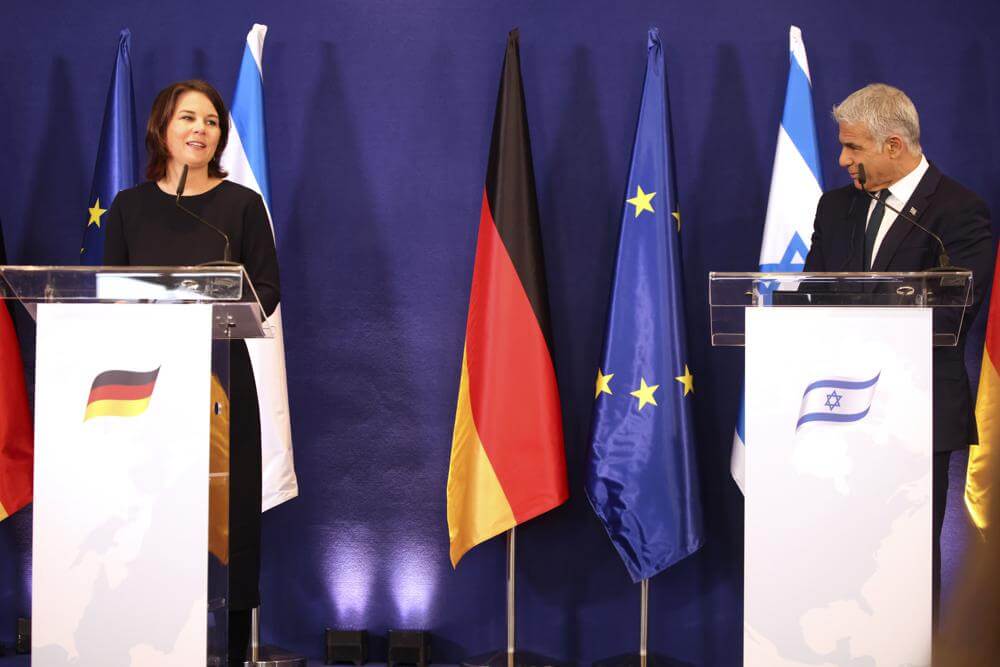German Minister of Foreign Affairs Annalena Baerbock said that restoring the 2015 Iran nuclear deal, formally known as the Joint Comprehensive Plan of Action (JCPOA), will make the Middle East a safer region during a visit to Israel, where she met Prime Minister (PM) Naftali Bennett and her Israeli counterpart Yair Lapid.
During a joint press conference with Lapid at Tel Aviv, Baerbock said that she was “convinced that a full restoration of the JCPOA would make the region more secure, including Israel, otherwise we would not be having these talks.” She stated that talks with Iran in Vienna are at the “final phase.”
Israel can continue to count on Germany's solidarity. For us, out of our responsibility for the horrors of the past grows a duty that holds for the present and the future. Together we will fight against anti-Semitism in the world. (1/3) - @ABaerbock pic.twitter.com/7lXTFyNeKK
— GermanForeignOffice (@GermanyDiplo) February 10, 2022
Noting that the ongoing talks are at a “very critical juncture,” she said a deal could be reached if Iran shows a “willingness to compromise” and rejects maximalist demands. “We want to do everything we can to ensure that with this agreement, Israel’s security is guaranteed,” she stated.
However, Lapid remained cautious about restoring the JCPOA and warned that a “nuclear Iran poses a risk not only to Israel, but the entire world.” Furthermore, he said that the E3 countries — France, Germany and Italy — “cannot ignore the threat posed by Iran beyond the nuclear issue,” referring to Tehran’s proxy network in the area that has strategically encircled Israel.
“Iran is Hezbollah in the north, Iran is Hamas in the south, Iran is an exporter of terrorism whose tentacles stretch from Yemen to Buenos Aires,” Lapid added.
This morning, I met with the Foreign Minister of Germany, @ABaerbock. We discussed the nuclear talks with Iran taking place in Vienna, which Germany is a part of. I presented the Minister with our position that a nuclear Iran endangers not only Israel, but the entire world. pic.twitter.com/Jmo8KJR7x2
— יאיר לפיד - Yair Lapid🟠 (@yairlapid) February 10, 2022
Israel and Iran have been waging a shadow war for decades in the Middle East and their conflict has spanned across the region, including in Syria, Lebanon, Gaza and Azerbaijan. Recently, both countries stepped up attacks against each other on land, sea and air.
Later, Baerbock met PM Bennett at his office in Tel Aviv. A statement from the Israeli PM’s office said that they discussed regional, bilateral and security ties, especially Iran’s nuclear programme.
Bennett warned that restoring the JCPOA “would be a mistake that would endanger the entire region.” He also said that a “target date” should be set for the conclusion of negotiations since the extension of talks “only serves Iranian interests.”
Israel remains opposed to any nuclear deal with Iran, as it views Tehran’s nuclear programme as an “existential threat,” especially since Iranian leaders have called for the annihilation of the Jewish State. Bennett has accused Iran of advancing its nuclear programme amid the ongoing negotiations in Vienna to restore the deal, which has rendered the JCPOA ineffective.
In December, the International Atomic Energy Agency (IAEA) accused Iran of enriching uranium with highly advanced centrifuges at its Fordow nuclear power plant. The nuclear watchdog said that Tehran has started the process of enriching uranium to 20% purity using a cluster of 166 advanced IR-6 machines at Fordow.
The IAEA also reported in August that Iran has been enriching uranium to 60% fissile purity, closer to the weapons-grade level of 90%. However, the 2015 deal stated that Iran could only enrich uranium up to 3.67% for the next 15 years.
Additionally, Baerbock discussed the Palestinian issue during her meetings with Lapid and Bennett and later travelled to the West Bank to meet with Palestinian President Mahmoud Abbas and Foreign Minister Riad Maliki. This was Baerbock’s first visit to the Middle East since assuming office and said she had “deliberately” chosen Israel as the first “port of call” because of the “unique, close and multifaceted” bilateral ties between Berlin and Tel Aviv.

